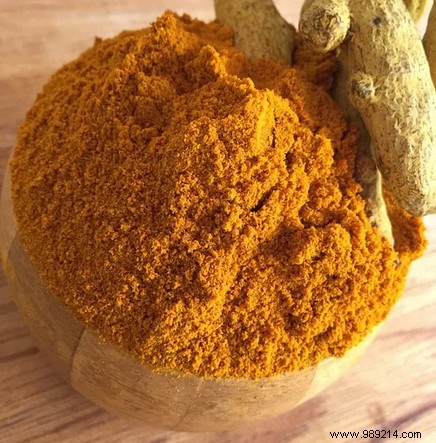Curcumin has been part of Indian culinary traditions for over 4000 years. This yellow polyphenolic pigment is therefore used in cooking but also as a food supplement. Its health properties would be rather numerous.
Curcumin (or diferuloyl-methane) is the main pigment in turmeric, also known as "turmeric" . This is food coloring E100 , giving a yellow color. In the kitchen, it is found in dairy products, dry mixes, sorbets and other ice creams. Some sweets also contain it. Note that curcumin does not have much taste compared to traditional saffron.
In addition, it is also used as a dietary supplement because the benefits of curcumin are multiple. By consuming it, it would be possible to prevent cancer and contribute to its treatment. There would also be positive effects on stomach ulcers and inflammatory diseases. Curcumin is also known to treat gingivitis, reduce hyperlipidemia, prevent the risk of cardiovascular disease and type 2 diabetes. Finally, it could improve cognitive performance in patients with Alzheimer's disease.
In a complete dossier, the magazine Passeport Santé has summarized the scientific work concerning curcumin. First, let us remember that scientific research against cancer is very active. In particular, trials have been underway since 2011 in the United States – via the US National Institutes of Health. According to scientists, the antioxidant and anti-inflammatory effects of curcumin may play a role in the prevention and treatment of this type of disease. An in vitro study conducted in South Korea and published in 2007 showed that curcumin inhibited the proliferation of cancer cells through the production of certain enzymes.
As far as cancer prevention is concerned, there is still little clinical data because the existing work incorporates samples not exceeding 25 people . However, there would indeed be a lower prevalence of certain cancers in countries where a lot of turmeric is consumed.

For the treatment of Alzheimer's disease there is insufficient clinical data. Thus, these do not confirm that consuming curcumin is beneficial for patients. An increase in vitamins has been proven by some studies, but not the improvement of cognitive functions . In terms of gingivitis, a randomized study from 2011 claimed that a turmeric-based mouthwash can reduce bacterial contamination as effectively as chlorhexidine. For rheumatoid arthritis, curcumin was shown to be as effective as phenylbutazone in studies dating back to 1980.
Two studies published in 2011 and 2012 mention a possible preventive effect of turmeric in case of diabetes. In the first, volunteers took three turmeric capsules (750 mg – between 75 and 85% curcumin content) twice a day for nine months. According to the results, 16% of the participants in the placebo group developed diabetes, and none in the "turmeric" group who also lost weight. In the second, diabetic patients with nephropathy – some of whom had kidney failure – took 22 mg of turmeric three times a day for two months. The results showed a decrease in urinary protein excretion . There is also a drop in levels of IL-8 – a molecule linked to infection – as well as TGF-β – a growth factor that is expressed abnormally in diabetes with nephropathy.
In the treatment of chronic inflammatory diseases, inflammatory bowel diseases, cardiovascular diseases, hyperlipidemia and diabetes, there are encouraging results. On the other hand, there are too few studies or concern too few volunteers, so much research is needed to obtain real certainty.